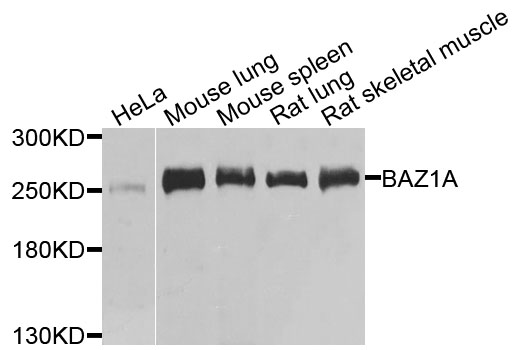-
Product Name
BAZ1A Polyclonal Antibody
- Documents
-
Description
Polyclonal antibody to BAZ1A
-
Tested applications
WB
-
Species reactivity
Human, Mouse, Rat
-
Alternative names
BAZ1A antibody; ACF1 antibody; WALp1 antibody; WCRF180 antibody; hACF1 antibody; bromodomain adjacent to zinc finger domain 1A antibody
-
Isotype
Rabbit IgG
-
Preparation
Antigen: Recombinant fusion protein containing a sequence corresponding to amino acids 1347-1556 of human BAZ1A (NP_038476.2).
-
Clonality
Polyclonal
-
Formulation
PBS with 0.02% sodium azide, 50% glycerol, pH7.3.
-
Storage instructions
Store at -20℃. Avoid freeze / thaw cycles.
-
Applications
WB 1:500 - 1:2000
-
Validations

Western blot - BAZ1A Polyclonal Antibody
Western blot analysis of extracts of various cell lines, using BAZ1A antibody at 1:1000 dilution.Secondary antibody: HRP Goat Anti-Rabbit IgG (H+L) at 1:10000 dilution.Lysates/proteins: 25ug per lane.Blocking buffer: 3% nonfat dry milk in TBST.Detection: ECL Basic Kit .Exposure time: 1s.
-
Background
Component of the ACF complex, an ATP-dependent chromatin remodeling complex, that regulates spacing of nucleosomes using ATP to generate evenly spaced nucleosomes along the chromatin. The ATPase activity of the complex is regulated by the length of flanking DNA. Also involved in facilitating the DNA replication process. BAZ1A is the accessory, non-catalytic subunit of the complex which can enhance and direct the process provided by the ATPase subunit, SMARCA5, probably through targeting pericentromeric heterochromatin in late S phase. Moves end-positioned nucleosomes to a predominantly central position. May have a role in nuclear receptor-mediated transcription repression.; Component of the histone-fold protein complex CHRAC complex which facilitates nucleosome sliding by the ACF complex and enhances ACF-mediated chromatin assembly. The C-terminal regions of both CHRAC1 and POLE1 are required for these functions.
Related Products / Services
Please note: All products are "FOR RESEARCH USE ONLY AND ARE NOT INTENDED FOR DIAGNOSTIC OR THERAPEUTIC USE"
